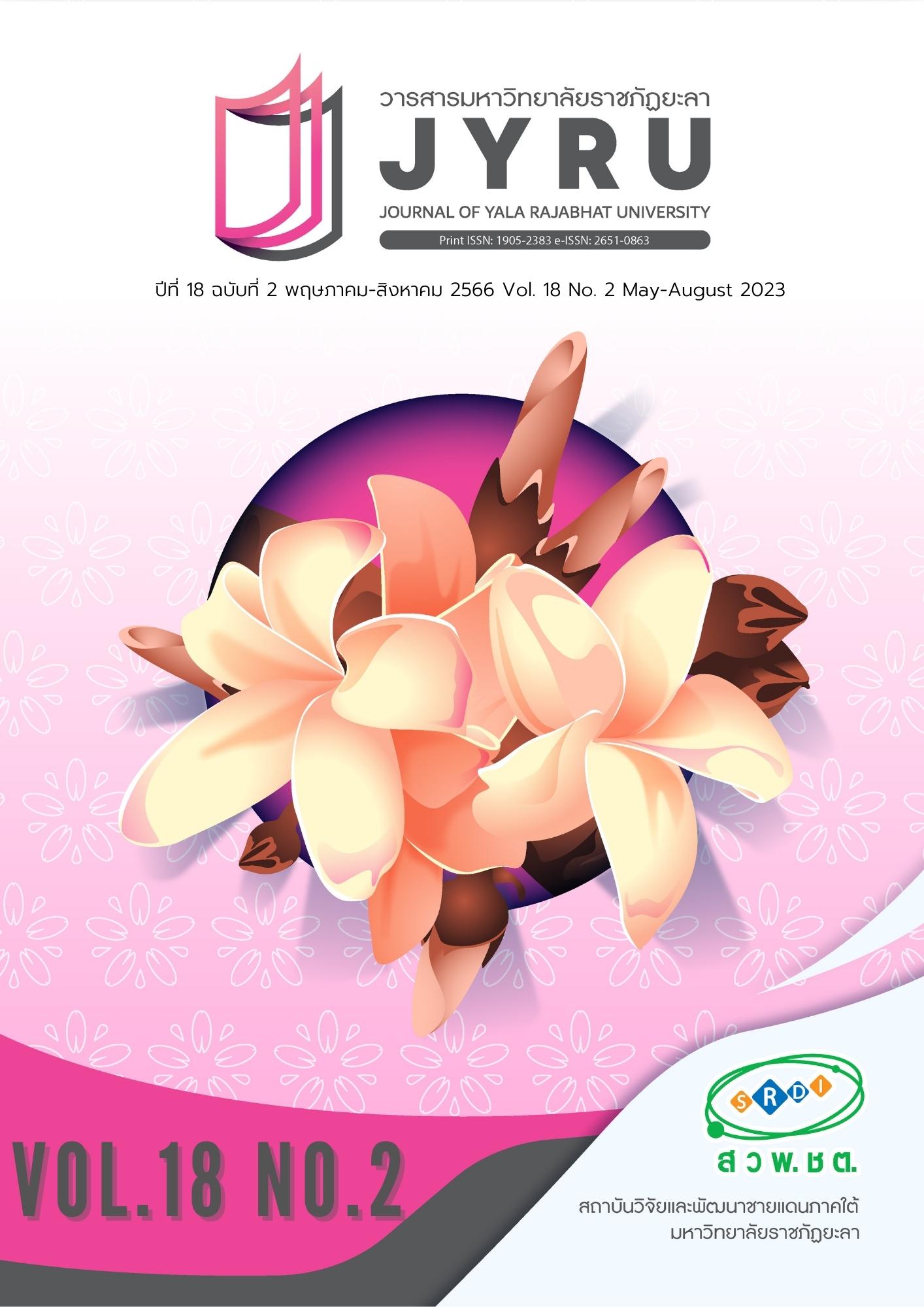การวิเคราะห์องค์ประกอบเชิงยืนยันการจัดการศึกษาแบบองค์รวม ในเขตพัฒนาพิเศษเฉพาะกิจจังหวัดชายแดนใต้
Main Article Content
บทคัดย่อ
สภาพการจัดการศึกษาในพื้นที่จังหวัดชายแดนใต้ ไม่คำนึงถึงความแตกต่าง เน้นวิชาเป็นตัวตั้งและแยกการเรียนรู้ การจัดการศึกษา ขาดสมดุลแบบองค์รวม เพื่อตอบโจทย์การพัฒนามนุษย์อย่างเต็มศักยภาพ การวิจัยนี้มีวัตถุประสงค์ เพื่อวิเคราะห์และตรวจสอบองค์ประกอบเชิงยืนยันการจัดการศึกษาแบบองค์รวมในเขตพัฒนาพิเศษเฉพาะกิจจังหวัดชายแดนใต้กับข้อมูลเชิงประจักษ์ ดำเนินการวิจัยแบบผสมวิธี 3 ขั้นตอน ดังนี้ 1) ศึกษาแนวคิดการจัดการศึกษาแบบองค์รวม สร้างแบบสัมภาษณ์กึ่งโครงสร้าง สัมภาษณ์เชิงลึกผู้ทรงคุณวุฒิ จำนวน 9 คน จัดคุณลักษณะเชื่อมกลุ่มคำได้ 7 คำหลัก 6 กลุ่มคำ และ 66 กลุ่มคำย่อย สร้างแบบสอบถามความคิดเห็น สอบถามผู้ทรงคุณวุฒิ จำนวน 17 คน พัฒนาเครื่องมือการวิจัยให้ผู้เชี่ยวชาญตรวจสอบความเที่ยงตรงเชิงเนื้อหาและหาค่าความเชื่อมั่น จำนวน 5 คน 2) สอบถามความคิดเห็น จากกลุ่มตัวอย่างการวิจัย จำนวน 317 คน มี 10 องค์ประกอบ 89 คุณลักษณะและ 3) สัมภาษณ์เชิงยืนยันผู้ทรงคุณวุฒิ จำนวน 9 คน การสัมภาษณ์เพื่อยืนยันองค์ประกอบการจัดการศึกษาแบบองค์รวมในเขตพัฒนาพิเศษเฉพาะกิจจังหวัดชายแดนใต้ ผลการวิจัยพบว่า องค์ประกอบการจัดการศึกษาแบบองค์รวมในเขตพัฒนาพิเศษเฉพาะกิจจังหวัดชายแดนใต้กับข้อมูลเชิงประจักษ์ในภาพรวม มีความสอดคล้อง ( 2/df = 3.580), (p-value = 0.000), (RMSEA = 0.090), (CFI = 0.972), (AGFI = 0.880) และ (RMR = 0.008) ควรนำผลการวิจัยไปกำหนดเป็นกลยุทธ์ในการยกระดับคุณภาพการจัดการศึกษาของสถานศึกษาในเขตพัฒนาพิเศษเฉพาะกิจจังหวัดชายแดนใต้
Article Details

อนุญาตภายใต้เงื่อนไข Creative Commons Attribution-NonCommercial-NoDerivatives 4.0 International License.
บทความ ข้อมูล เนื้อหา รูปภาพ ฯลฯ ที่ได้รับการเผยแพร่ในวารสารมหาวิทยาลัยราชภัฏยะลานี้ ถือเป็นลิขสิทธิ์ของวารสารมหาวิทยาลัยราชภัฏยะลา หากบุคคลหรือหน่วยงานใดต้องการนำทั้งหมดหรือส่วนหนึ่งส่วนใดไปเผยแพร่ต่อหรือกระทำการใดๆ จะต้องได้รับอนุญาตเป็นลายลักษณ์อักษรจากวารสารมหาวิทยาลัยราชภัฏยะลาก่อนเท่านั้น
เอกสารอ้างอิง
Ahlam, A. (2017). Teaching sustainable practices as part of a holistic education in the Saudi context. International Journal of The Whole Child 2017, 2(2), 29-40.
Bunduki, B. K. H. & Higgs, L.G. (2016). Defining integrated learning: Perspectives from alumni of the christian university in the democratic republic of the Congo (DRC). KOERS—Bulletin for Christian Scholarship, 81(2), 1-9.
Chotiphan, P. (2013). Teaching for the development of higher thinking skills. PBL Walailak University Newsletter, 6(1), 8-9. (in Thai)
Forbes, S. H. (2003). Holistic Education: An analysis of its ideas and nature (8th ed.). Vermont : The Foundations of Educational Renewal.
Islahuddin, I. T. & Mansyur (2016). A holistic model of partnership in education. International Journal of Environmental & Science Education, 11(13), 5915-5924.
Miller, J. (2000). Education and the soul:Toward a spiritual curriculum. Albany: State University of New York Press.
OECD (2016), Global competency for an inclusive world [Online]. Retrieved March 23, 2022, https://www.oecd.org/education/Global-competency-for-an-inclusive-world.
Oyewo, A. S. (2018) Holistic leadership approach as a model to schools implementing change [Online]. Retrieved July 14, 2022, from: https://www.academia.edu/38607266/TITLE_Holistic_leadership_approach_as_a_model_to_schools_implementing_Change.
Patumarak, J. & Boonyananta, S. (2019). Guidelines for multidisciplinary art activities to enhance holistic learning of fifth grade students. Journal of Humanities Social Sciences and arts Silpakorn University, 12(6), 153-170 (in Thai)
Phimpha, P. (2018). Current Thai education. Journal of Mahamakut Wittayalai University Roi Et Campus, 7(1), 242-249. (in Thai)
Pimklad, N.,Thongsri, N., Sirinon, C., Prachanan, P., Laothong, A., Chantaram, J., & Phaisirikul, R. (2017). Holistic learning management approaches. Journal of Research & Development Buriram Rajabhat University, 12(2), 92-102. (in Thai)
Piromkraiphak, S. Suntrayuth, D. & Kosaiyawat, S. (2016). A model of learning self awareness in responsibility of unequal opportunity children by participatory action research for Rajaprajanugroh 50 school, Khonkean province. Education and Social Development, 12(1), 69-79. (in Thai)
Shaked, H. & Schechter, C. (2017). Systems thinking for school leaders holistic leadership for excellence in education. Cham: Springer Nature.
Srirat, N. (2021). Creating a positive attitude in working according to Buddhism. Journal of MCU Social Science Review, 10(2), 387-396. (in Thai)
Sterling, L. & Davidoff, S. (2000). The courage to lead : A whole school development approach. Kenwyn: Juta.
Suwanphahu, B. Tuicomepee, A. & Kaemkate, W. (2013). Wellness in adolescents : Conceptual framework and psychological measures. Journal of Behavier Science, 19(2), 127-137. (in Thai)
Thongmark, S. Neimted, W. Choosuwan, R. & Sittichai, R. (2018). Looking backwards and forwards of educational quality in three southern border provinces of Thailand. Princess of narathiwas university journal of humanities and social sciences, 5(Special), 186-198. (in Thai)
Yuenyaw, P. (2018). Super leader of educational administrators. Veridian E-Journal, 11(1), 2886-2899.
(in Thai)


